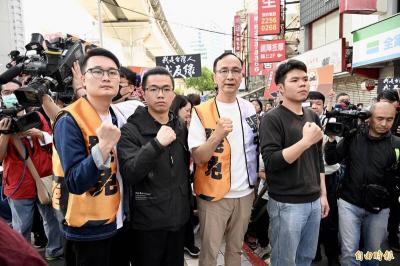Kaohsiung has culled 238 green iguanas so far this year, under a program that it began in 2013 to maintain an ecological balance, a city official said yesterday.
In 2013, it was found that the city’s Niaosong District (鳥松) was a major habitat for wild green iguanas, the official said, citing a field study done by National Pingtung University of Science and Technology.
The Kaohsiung Bureau of Agriculture later that year commissioned the university to cull the non-native reptiles to help avert ecological and environmental problems, the official said.
The iguana population in Kaohsiung has grown as a result of owners of pet iguanas abandoning or releasing the reptiles into the wild, the official said.
In the period between June and December 2013, 107 green iguanas were captured in Kaohsiung, the official said.
Since then, the official said, the numbers have dropped significantly as 74 were culled last year and 238 have been captured so far this year.
The official said the reptiles have been found not just in Niaosong, but also in the city’s Cianjhen (前鎮), Siaogang (小港), Sanmin (三民) and Zihguan (梓官) districts.
Green iguanas tend to eat mostly crickets and animal eggs when they are young.
Healthy adult iguanas can measure up to 1.5m in length and might damage and destroy plants, shrubs, trees and flowers, including orchids, the official said.
If the reptiles reproduce in large numbers, they can also pose a threat to Taiwan’s indigenous species, the official added.

The Ministry of Economic Affairs has fined Taobao NT$1.2 million (US$36,900) for advertisements that exceeded its approved business scope and ordered the Chinese e-commerce platform to make corrections in the first half of this year or its license would be revoked. Lawmakers have called for stricter supervision of Chinese e-commerce platforms and more stringent measures to prevent China from laundering its goods through Taiwan as US President Donald Trump’s administration cracks down on origin laundering. The legislature’s Finance Committee yesterday met to discuss policies to prevent China from dumping goods in Taiwan, inviting government agencies to report on the matter. Democratic Progressive Party

Taiwan and its Pacific ally Tuvalu on Tuesday signed two accords aimed at facilitating bilateral cooperation on labor affairs, according to Taiwan’s Ministry of Foreign Affairs (MOFA). The governments inked two agreements in Taipei, witnessed by Foreign Minister Lin Chia-lung (林佳龍) and visiting Deputy Tuvaluan Prime Minister Panapasi Nelesone, MOFA said in a news release. According to MOFA, the agreements will facilitate cooperation on labor issues and allow the two sides to mutually recognize seafarers’ certificates and related training. Taiwan would also continue to collaborate with Tuvalu across various fields to promote economic prosperity as well as the well-being of their

The Taipei District Prosecutors’ Office has continued its investigation into allegations of forged signatures in recall efforts today by searching the Chinese Nationalist Party’s (KMT) city chapter and questioning several personnel including the chapter director, according to media reports. Among those questioned and detained were KMT Taipei chapter director Huang Lu Chin-ju (黃呂錦茹), chapter secretary-general Chu Wen-ching (初文卿), chapter secretary Yao Fu-wen (姚富文) and first district committee executive director Tseng Fan-chuan (曾繁川). Prosecutors said they would not confirm reports about who had been summoned. The investigation centers on allegations that the ongoing recall campaigns targeting Democratic Progressive Party legislators Rosalia Wu (吳思瑤)

Several Chinese Nationalist Party (KMT) officials including Chairman Eric Chu (朱立倫) are to be summoned for questioning and then transferred to prosecutors for holding an illegal assembly in Taipei last night, the Taipei Police said today. Chu and two others hosted an illegal assembly and are to be requested to explain their actions, the Taipei City Police Department's Zhongzheng (中正) First Precinct said, referring to a protest held after Huang Lu Chin-ju (黃呂錦茹), KMT Taipei's chapter director, and several other KMT staffers were questioned for alleged signature forgery in recall petitions against Democratic Progressive Party (DPP) legislators. Taipei prosecutors had filed